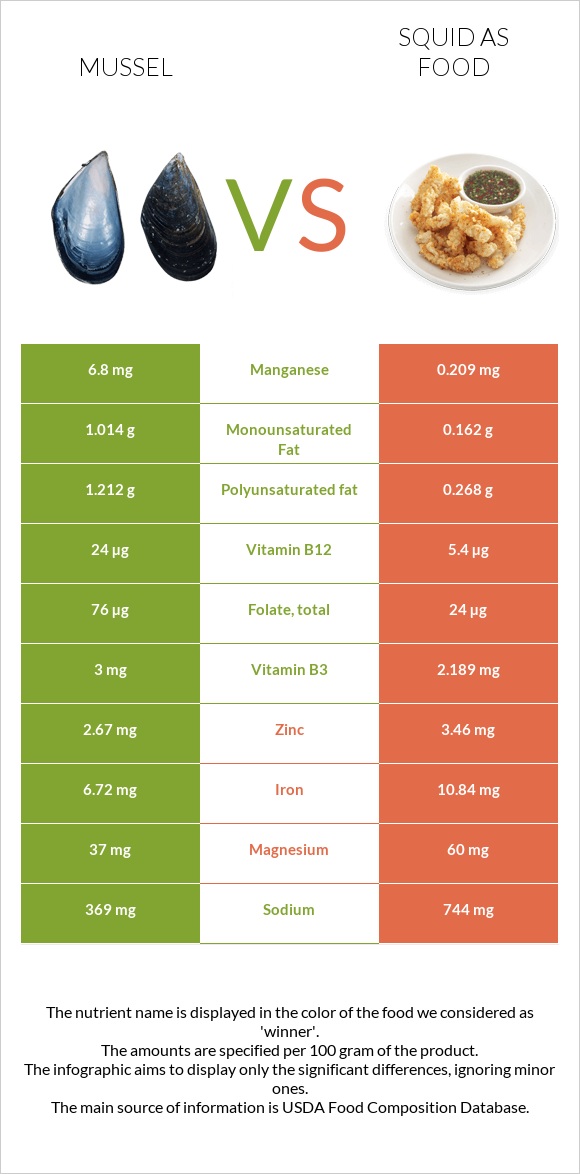Mussels vs. Squid — In-Depth Nutrition Comparison
Compare
The main differences between mussels and squid
- Mussels is richer in vitamin B12, manganese, and vitamin B1, yet squid is richer in vitamin B2, copper, iron, phosphorus, and calcium.
- Daily need coverage for vitamin B12 for mussels is 775% higher.
- Mussels contains 33 times more manganese than squid. Mussels contains 6.8mg of manganese, while squid contains 0.209mg.
- Mussels contains less sodium.
Food types used in this article are Mollusks, mussel, blue, cooked, moist heat and Mollusks, cuttlefish, mixed species, cooked, moist heat.
Infographic

Infographic link
Mineral Comparison
Mineral comparison score is based on the number of minerals by which one or the other food is richer. The "coverage" charts below show how much of the daily needs can be covered by 300 grams of the food.
| Contains less SodiumSodium | -50.4% |
| Contains more ManganeseManganese | +3153.6% |
| Contains more MagnesiumMagnesium | +62.2% |
| Contains more CalciumCalcium | +445.5% |
| Contains more PotassiumPotassium | +137.7% |
| Contains more IronIron | +61.3% |
| Contains more CopperCopper | +569.8% |
| Contains more ZincZinc | +29.6% |
| Contains more PhosphorusPhosphorus | +103.5% |
Vitamin Comparison
Vitamin comparison score is based on the number of vitamins by which one or the other food is richer. The "coverage" charts below show how much of the daily needs can be covered by 300 grams of the food.
| Contains more Vitamin CVitamin C | +60% |
| Contains more Vitamin B1Vitamin B1 | +1664.7% |
| Contains more Vitamin B3Vitamin B3 | +37% |
| Contains more Vitamin B12Vitamin B12 | +344.4% |
| Contains more FolateFolate | +216.7% |
| Contains more Vitamin AVitamin A | +123.1% |
| Contains more Vitamin B2Vitamin B2 | +311.7% |
| Contains more Vitamin B6Vitamin B6 | +170% |
All nutrients comparison - raw data values
| Nutrient |  |
 |
DV% diff. |
| Vitamin B12 | 24µg | 5.4µg | 775% |
| Manganese | 6.8mg | 0.209mg | 287% |
| Vitamin B2 | 0.42mg | 1.729mg | 101% |
| Copper | 0.149mg | 0.998mg | 94% |
| Cholesterol | 56mg | 224mg | 56% |
| Iron | 6.72mg | 10.84mg | 52% |
| Phosphorus | 285mg | 580mg | 42% |
| Vitamin B1 | 0.3mg | 0.017mg | 24% |
| Protein | 23.8g | 32.48g | 17% |
| Sodium | 369mg | 744mg | 16% |
| Calcium | 33mg | 180mg | 15% |
| Vitamin B6 | 0.1mg | 0.27mg | 13% |
| Folate | 76µg | 24µg | 13% |
| Vitamin A | 91µg | 203µg | 12% |
| Potassium | 268mg | 637mg | 11% |
| Zinc | 2.67mg | 3.46mg | 7% |
| Vitamin C | 13.6mg | 8.5mg | 6% |
| Polyunsaturated fat | 1.212g | 0.268g | 6% |
| Fats | 4.48g | 1.4g | 5% |
| Magnesium | 37mg | 60mg | 5% |
| Vitamin B3 | 3mg | 2.189mg | 5% |
| Saturated fat | 0.85g | 0.236g | 3% |
| Carbs | 7.39g | 1.64g | 2% |
| Monounsaturated fat | 1.014g | 0.162g | 2% |
| Calories | 172kcal | 158kcal | 1% |
| Vitamin B5 | 0.95mg | 0.9mg | 1% |
| Net carbs | 7.39g | 1.64g | N/A |
| Selenium | 89.6µg | 89.6µg | 0% |
| Tryptophan | 0.267mg | 0.364mg | 0% |
| Threonine | 1.025mg | 1.398mg | 0% |
| Isoleucine | 1.036mg | 1.414mg | 0% |
| Leucine | 1.676mg | 2.287mg | 0% |
| Lysine | 1.779mg | 2.427mg | 0% |
| Methionine | 0.537mg | 0.733mg | 0% |
| Phenylalanine | 0.853mg | 1.164mg | 0% |
| Valine | 1.04mg | 1.419mg | 0% |
| Histidine | 0.457mg | 0.624mg | 0% |
| Omega-3 - EPA | 0.276g | 0.078g | N/A |
| Omega-3 - DHA | 0.506g | 0.132g | N/A |
| Omega-3 - DPA | 0.044g | 0.012g | N/A |
Macronutrient Comparison
Macronutrient breakdown side-by-side comparison
| Contains more FatsFats | +220% |
| Contains more CarbsCarbs | +350.6% |
| Contains more ProteinProtein | +36.5% |
~equal in
Water
~61.12g
~equal in
Other
~3.36g
Fat Type Comparison
Fat type breakdown side-by-side comparison
| Contains more Mono. FatMonounsaturated fat | +525.9% |
| Contains more Poly. FatPolyunsaturated fat | +352.2% |
| Contains less Sat. FatSaturated fat | -72.2% |



